For artists and collectors sponsored by Intercal...your mohair supplier and Johnna's Mohair Store
Back in the late 70s and into the 80s, I did a LOT of butterfly photography and even had (what I called) my own little Backyard Butterfly Farm. I planted stuff that attracted butterflies that laid their eggs there. Then I harvested the caterpillars, put them in glass containers, fed them their host plant, and watched as they morphed into a chrysalis. Then when they emerged as a gorgeous butterfly, I shot their photos before they went off and had their wings maimed by whatever. Haven't done any of that since we moved to Double Oak in 1985, but I had the great fortune a couple of weeks ago to find two monarch butterfly caterpillars on a milkweed plant growing in our yard. HA . . . back to my old ways. I put them in a container and waited like an expectant mom. Today was the day for one of them to be "born". Unfortunately, I didn't photograph all the stages, but here are some of the pics. I wasn't quick enough to get a good photo with the wings spread open, but got a fair one. Here is a link to a great monarch website that has superb photos of all the stages. http://www.monarchbutterflyusa.com/Cycle.htm If you're interested, of course.
This is the empty chrysalis and one that has a few more days to go.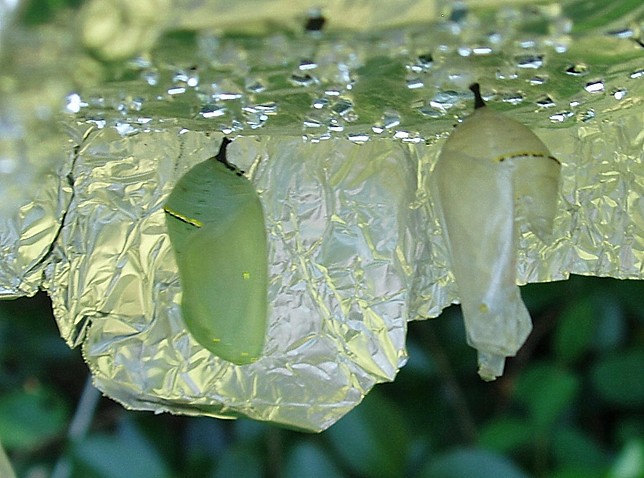
This is soon after emerging from the pupa, with wings not fully dried.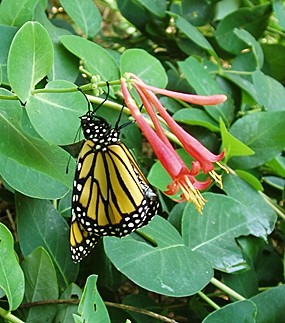
The butterfly is still not able to fly. 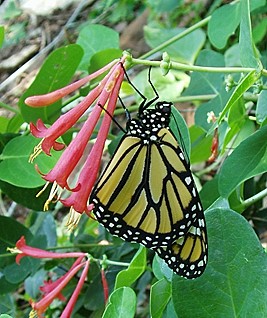
A little more of the wings are showing . . . you can see a deep orange.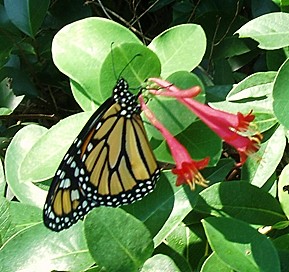
It's a little stronger now and spreading the wings.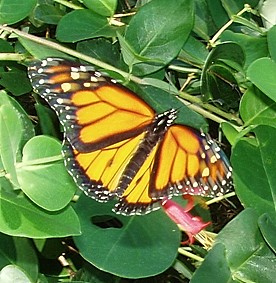
It took a short flight to another plant and rested for another hour or so.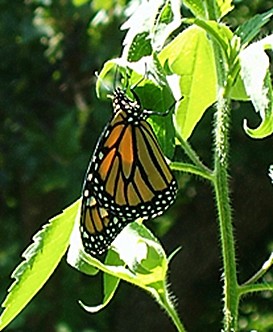
Now ready to fly - and away it went.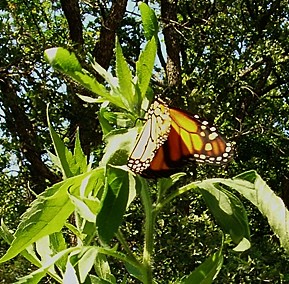
This whole cycle lasted approximately 3-4 hours from the moment it emerged from the pupa to when it flew away.
I find it all very fascinating. 



Amazing pics. Isn't nature wonderful.
Jane
Great pictures, Sue Ann.
I love the Monarch Butterflies. When Allyn and I were first married, we lived in Pacific Grove in Northern California...it's contiguous to Monterey. Every October the Monarchs migrate from Alaska to Pacific Grove and it is a beautiful sight. They are all over the trees and plants and are just amazing. Lover's Point in PG is their main hangout when they arrive and there are millions of them. It's a huge tourist time as well as people come from all around the world to see the butterflies.
http://www.pgmuseum.org/Monarchs.htm
This site gives you a little about the migration.
It's interesting that these Monarchs migrating to Northern California live longer than a normal Monarch. Every generation of the Monarch only lives about 6 weeks, but the migration generation lives up to 9 or 10 months and fly over 2,000 miles. I suppose that they cannot live in the far Northern climates and this migration generation takes on this huge task of traveling so far so the species can survive...that's just my guess, I don't know that for a fact.
But I agree, Sue Ann, they are a beautiful sight and very interesting.
:hug: :hug:
Thanks SueAnn for sharing such a special part of nature...I love butterflies of all kinds!!!
Hugs &
Sue Ann, your post brings back a lot of memories! When our kids were small, we always hatched monarch butterflies in the summer. My kids grew used to watching them hatch, but I kept it up because my dad never grew tired of watching them. He loved to visit when we were waiting for them to hatch. It really made me smile to see him - he was like a little kid. We are now thinking it's about time to do it for our grandson. Thanks for the memories.
hugs,
Brenda
Amazing photos, thanks so much for sharing!
Wow that is amazing, must have been great to see this emerging
Pauline
OH Sueann I so do luv butterflies. Thankyou for that it really has me fascinated. :hug:
OK I did my homework. Your Monarch is a boy. hehehehheheh But of course you knew that. But I didnt. hahahah
ohhhh how beautiful. What a fascinating cycle they go through - and what an interesting thing you do.



 Beautiful photography - thankyou so much for sharing.
Beautiful photography - thankyou so much for sharing.
Danni
Thanks for checking out the photos and for your nice comments. Good eye, Wendy . . . "it" is definitely a boy monarch! I hope to find some caterpillars in the fall to hatch. Those are the ones that migrate to CA and Mexico. They pass through Texas going to Mexico and sometimes we see many of them at one time. Just gorgeous!
Oh, truly beautiful Sue Ann! I never knew anyone that harvested caterpillars before, but the results seem well worth it 

We just bought a few hummingbird and butterfly plants today for the back garden, so this seems a very timely thread for me to look at! We won't mention the dog leaping through the air, trying to eat a passing Tiger Swallowtail. Ahem. Nope, definitely won't mention that one.
Bear hugs,
Kelly
I never knew it happened so fast, they are amazing!!!!
:hug:
Jodi
Thanks for sharing your photos SueAnn.
We used to have swan plants and watch the miracle of the Monarch butterfly hatching out - I find it so fascinating.
Hugs
Carolyn

Bingo! There are 4 milkweed plants that got overlooked in the gardens' general primpings and clean-ups so far this spring. I've followed this discusiion with interest and was torn about turfing them out. I just came into the studio/computer room to see a monarch landing on them right outside the window. Looks like I'll be hatching babies too!
Just looked back to check if she was still there (however do they spy that particular greenery in acres full of everything else??) and realized how lucky I was to see her. What with all of the 17 yr cicadas flapping about wildly, it's like a noisy throbbing blizzard out there. Their 17 yr adolescence doesn't include flying lessons...
Thought I'd give you a view out one side of the studio window. It's quite breezy todat so it was hard to make this Feathered Buckthorn bush stay in focus. It doesn't know it yet but it's about to turn 'Toes Up'!
From the number of cicadas drilling holes along the branches, it'll surely die late this fall or over winter. The silly buggers aren't supposed to be attacking shrubs, just trees.
I have a thread-leaf red Japanese maple that's about 3' high after 26 years. I tried wrapping it in netting 3 times and they still found their way in through the folded over & over stapled seams. I guess I'll get to do some shopping next spring!


Wow!! amazing photos and you too Sue Ann! I never knew you did this. It must have been so beautiful and fascinating 
Our 4 yo grandie was holding a coupled pair up by one wing, "Look Grandma, they're 'dancing' !"
In the second pic, on the left, all of those out-of-focus brown spots in the grass are more cicadas - the ones that blundered into the trees and fell to the ground rather than grabbing a leaf or a branch.
I enjoy the spectacle because one gets only 4 or at the most 5 of these in a life time, but I feel like wearing netting myself as I race between house & garage. They really should take flying lessons....
I have to tell you that your photo story is just gorgeous! I think butterflies are just amazing. I made my hubby build me a couple of Butterfly houses from plans we got from our local Extension Service. Anyway, thanks for sharing!
WOW!!! What amazing pics! Nature is certainly wonderful!

How glorious Sue Ann!!!!!! Thanks ever so much for sharing!  :hug:
:hug:
Kim Basta
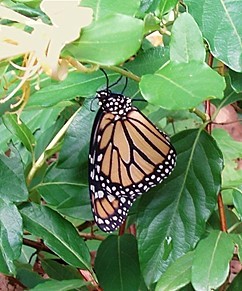 Well, poo and rats . . . the second monarch emerged sometime before I got up this am, so I only had enough time to put it out on the honeysuckle and take a couple of pics before she was ready to move on. Check it out, Wendy . . . it's a girl! Thanks, everybody, for looking and I appreciate your responses. Ooooooh, Bobbie, don't all those cicadas make a terrible racket? All that buzzing - eeek!
Well, poo and rats . . . the second monarch emerged sometime before I got up this am, so I only had enough time to put it out on the honeysuckle and take a couple of pics before she was ready to move on. Check it out, Wendy . . . it's a girl! Thanks, everybody, for looking and I appreciate your responses. Ooooooh, Bobbie, don't all those cicadas make a terrible racket? All that buzzing - eeek!
Rats Sue Ann, your second image isn't showing up... OK, now it is
The 'racket' is very interesting. It's several sounds actually. The first one to start in the morning about 6:30 is a high humming that one associates with flying saucers, then the click click ratcheting sound if you have one by the wings and shake it, which sounds like a rattlersnake's shake to me, and then the pulsating loud & louder sound that most cicadas make, but many many times louder than the annual August ones. It's almost a town-by-town, block-by-block thing, with some having very few and us being in a heavy zone.
I figured it out - this would be my Dad's 6th episode, at 93, and if he still lived here in the upper Midwest. 1922, 1939, 1956, 1973, 1990 and now 2007 It's only my 4th. With all the digging we've done in our gardens, I'm suprised that we had this many emerge.
What gives it even more of an alien look is the number trees that are swathed in aluminum foil about 3' up from the ground. The thought is that that would stop them from climbing up the trees to shed the exoskeleton.
I guess those ppl forgot that they fly after their wings harden, like the monarchs. It's a natural pruning for older trees, and it's the young trees that're in danger of loosing too much of their tip growth when the Mommies spike the tender tips in 6" strips to lay their eggs. Which fall to the ground in about 6 weeks as nymphs, to burrow underground and stay for another 17 years.
Sue Ann those pictures are just so beautiful. I just love butterflies, there is something magical about them. I could watch them for hours. My children both had cocoons in their kindergarden classes and got to watch them change. I enjoyed going in to their classroom everyday to see the changes and then see them release the butterflies into the woods.
I was woken up our first morning in the country in Thailand by the wierdest noise that gradually rose to a crescendo and then tapered off. Then again at dusk, same noise. I found out it was the cicadas - never saw them but the noise was incredible - so surreal.
Marion
oh how glorious!!! Love the pictures...